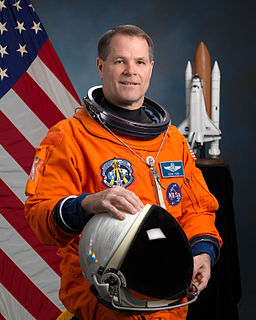A Quote by Neil deGrasse Tyson
I'm baffled all the time. We don't know what's driving 96% of the universe. Everybody you know and love and heard of and think about and see in the night sky through a telescope: four percent of the universe.
Related Quotes
I've got a telescope in my garden and one of the things I love to do is go out and let the sky, the night sky, the galaxies, the Orion nebula, have an impact on my mind. I find that awe inspiring. And just to contemplate on what the astronomers have revealed to us about the immense size and so on of the universe. I find that very healthy. And it's a good thing to do.
You know; when I look at the night sky and I see this enormous splendor of stars and galaxies, I sometimes ask the question, well how many worlds are we talking about? Well do the math, there are about 100 billion galaxies that are in the visible universe and each galaxy in turn contains about 100 billion stars, you multiply and you get about ten billion trillion stars. Well I think it is the height of arrogance to believe that we are alone in the universe, my attitude is that the universe is teaming, teaming with different kinds of life forms
When we look at the universe, what we see by eye or with our telescopes is only five percent of the universe. The rest, 95 percent is dark. Dark meaning, first of all, not visible to our instrument. Second, dark also indicates our ignorance. We don't know what's the composition of this part of the universe.
I look up at the night sky, and I know that, yes, we are part of this Universe, we are in this Universe, but perhaps more important than both of those facts is that the Universe is in us. When I reflect on that fact, I look up — many people feel small, because they’re small and the Universe is big, but I feel big, because my atoms came from those stars.
Now, almost one hundred years later, it is difficult to fully appreciate how much our picture of the universe has changed in the span of a single human lifetime. As far as the scientific community in 1917 was concerned, the universe was static and eternal, and consisted of a one single galaxy, our Milky Way, surrounded by vast, infinite, dark, and empty space. This is, after all, what you would guess by looking up at the night sky with your eyes, or with a small telescope, and at the time there was little reason to suspect otherwise.
We've known for a long time that the universe is expanding. But about 15 years ago, my colleagues and I discovered that it is expanding faster and faster. That is, the universe is accelerating, and that was not expected, but it is now attributed to this mysterious stuff called dark energy which seems to make up about 70 percent of the universe.
Everything we do understand about the universe - the periodic table of elements, Einstein's laws, Newton's laws, all of chemistry, all of biology - that's 4 percent of the universe. We got to the moon on the 4 percent we do understand. We landed on Mars on the 4 percent we do understand. So the day we crack the nut of the rest of that 95 percent... Oh my gosh.






























